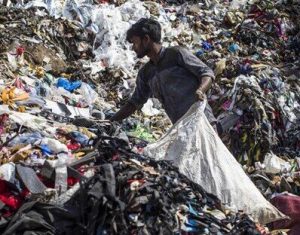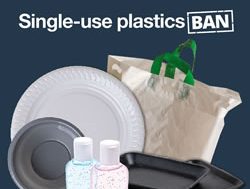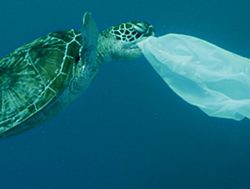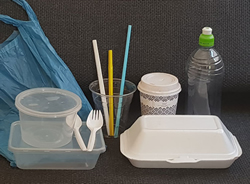Murali Krishnan* says plastic waste has become a significant source of pollution in India, but the country is struggling to find an alternative to single-use plastics and establish an effective waste management system.
 Three months after India imposed a ban on single use plastics (SUPs) to tackle plastic waste and worsening pollution, plastics are still in rampant circulation across the country.
Three months after India imposed a ban on single use plastics (SUPs) to tackle plastic waste and worsening pollution, plastics are still in rampant circulation across the country.
The ban includes almost 21 SUP items such as plates, cups, cutlery, straws, packaging films and cigarette packets.
Director of non-Government organisation, Toxics Link, Ravi Agarwal said although the Central Government has issued the ban, the implementation lay with the respective State Governments.
“The State’ actions are not up to the mark; there seems to be lack of an effective strategy to enforce the ban fully,” Mr Agarwal said.
India, which uses about 14 million tons of plastic annually, has not issued any advisory to stop the use of SUPs, and no penalties have been imposed following the ban.
SUP products continue to be available as before.
Chair of the Central Pollution Control Board, Tanmay Kumar highlighted in a recent communication that despite the ban, the use of SUP items, specifically thin carry-bags, also continued unabated in the low-end section of the economy.
Last year, a Government committee identified the SUP items to be banned based on an index of their low utility and high environmental impact.
The share of plastic used for these banned SUPs is less than three per cent of the total plastic waste generated in India.
Prime Minister, Narendra Modi made it clear that his Government would be actively working towards a crackdown on plastic in its second term in office.
However, experts warned it would not be an easy task given that close to 26,000 tons of plastic waste is generated across India every day.
In addition, more than 10,000 tons stay uncollected.
Mr Agarwal stressed that alternatives to SUPs are needed.
“Availability of cheap alternatives to offset the demand for these banned products is a critical challenge which needs to be looked into,” he said.
Founder and Director of Chintan Environmental Research and Action Group, Bharati Chaturvedi pointed out that investments to make the transition are inadequate.
“There have to be incentives for this shift. Manufacturers have to be told on no uncertain terms,” Ms Chaturvedi said.
“The plastics industry really needs a tsunami to shake it up.”
India’s per capita consumption of plastic at 11 kilograms per year is still among the lowest in the world (global average is 28 kilograms per year).
In 2020-21, India generated nearly 3.5 million tons of plastic, according to Government figures provided by the country’s 28 States and eight Union Territories.
Maharashtra produces 13 per cent of this, followed by Tamil Nadu and Punjab at 12 per cent each.
Meanwhile, India’s recycling capacity at 1.56 million tons per year can deal with only half of the total of plastics generated.
India also lacks an organised plastic waste management system, resulting in widespread littering.
Plastics end up in rivers, oceans and landfills, threatening the lives of wildlife species.
The ban as it stands also impacts the most vulnerable segments of society, especially the small and medium enterprises of the plastic industry, with the potential for job losses.
Industry experts are calling on the Government to carry out a thorough economic and environmental cost-benefit analysis, as well as a plan to take into account social and economic impacts.
Director-General of the All India Plastic Manufacturers Association (AIPMA), Deepak Ballani said the industry wanted a clean India and was ready to transition.
“We need to improve waste segregation and amp up our recycling infrastructure,” Mr Ballani said.
The AIPMA has requested the Government push the deadline for phasing out SUP products back by a year due to the economic distress still being caused by the COVID-19 pandemic.
All stakeholders involved — producers of raw materials, plastic manufacturers, giant fast-moving consumer goods companies, and Government entities — have their parts to play.
However, Chief Executive of the International Forum for Environment, Sustainability and Technology, Chandra Bhushan doubts that a simple ban alone will ever eliminate SUPs.
“There needs to be marketing of affordable alternatives as well as improvements in waste management to achieve results,” Mr Bhushan said.
*Murali Krishnan is an international broadcaster, based in New Delhi, who is also a correspondent for Deutsche Welle, Germany’s National broadcaster, and a regular contributor to Radio Australia’s Connect Asia.
This article first appeared on the Deutsche Welle website.










